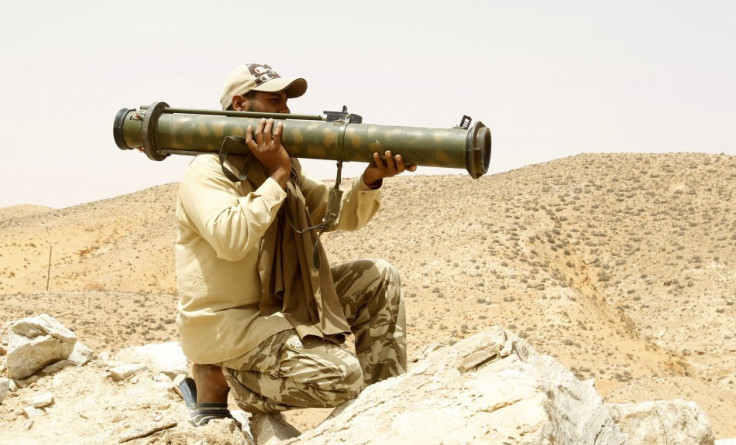Libya Between Contradictions and Suspicions: Can the Rebels Recover?

According to National Transition Council sources, on Sunday, rebel fighters became engulfed in an eight-hour gunfight against what their leaders called the "Fifth Column" of Gaddafi loyalists in Benghazi.
While previous warnings that more background checks and a higher training standard were necessary to prevent rogue elements from infiltrating the rebel movement have been issued by political analysts for months, it seems now that dissident elements from within the movement are threatening to bring down the NTC fighters.
While the council denied previous allegations that its forces on the ground were far from homogenous, but instead made up of different factions from the opposition that would struggle for more political space, it has now emerged that a rebel brigade has tried to take control of Benghazi.
Reports reveal that the gunfight in Benghazi started on Sunday, just after midnight and lasted until about eight a.m., as the NTC fighters launched an assault on a factory they said was occupied by an armed gang.
At a news conference on Sunday, rebel leaders said that three of their own fighters had died and eight were wounded.
Explaining their move, leaders said they had decided to launch the assault as they tried to bring all the armed brigades in the city under their direct authority.
As news of a "Fifth Column" emerged, puzzled journalists asked Mustapha el-Sagazly, the deputy interior minister, why the rebels' security forces had not interned or raised the alarm sooner.
Providing a vague answer, el-Sagazly claimed that the group had previously associated itself with a prominent local tribe that officials were afraid to alienate. "Since the issue of the tribes is sensitive, we did not want to stop them from the early days," he said.
Amid fear that the general's tribe could now seek revenge against some of its members, it is said that rebel leaders have specifically chosen the successor of General Younis, from among his tribe, the Obeidi, the largest in the eastern Libya. Also, while General Younis never achieved unanimity within the rebel forces (he was a close friend of Gaddafi up until the beginning of the conflict), troops now have orders to refer to him as a "martyr."
The death of Younis also reignited tensions within the rebels' leadership. While a spokesman for the rebels' Defence Minister, Ahmed Bani insisted the arrest warrant against Younis had been cancelled and the general was thus wrongly arrested, the council's Minister of Finance, Ali Tarhouni, contradicted his account minutes later, which prompted Bani, to say that "Mr Tarhouni is responsible for the oil fields. He is not authorized to speak on behalf of the military. He just said to you what is being said on the street."
Tarhouni's claim that the arrest warrant was legitimate was also backed by the rebels' most senior leader, Mustapha Abdul Jalil, who announced Younis' death.
Talking about the mysterious "Fifth Column," el-Sagazly and other officials said the group in the factory had called itself the Yousef Shakir brigade, in honour of a pro-Gaddafi commentator on state television who originates from Benghazi.
According to officials, Shakir gave the dissidents orders over the television, and broadcast minute-to-minute details of the fighting during the battle.
Rebel officials said the group had benefited from the state of confusion of the last few days to break into Benghazi prisons and free prisoners of war.
While none of the allegations can be verified, media present in Libya have warned that rebel officials told them they could face legal action over what they write, if their reports were to be found "inaccurate" or "divisive, raising fears of the NTC also implementing authoritative measures.
Asked why the rebel government was not more open about its investigation of the general's death, Bani replied by questioning the motives of journalists.
"We don't know if anybody here is a Fifth Column," he said of the reporters at a news conference. "It is very difficult to determine who is with you and who is against you in a time of conflict, because you don't necessarily have to hold a weapon. With a word or a rumor they can cause a lot of deaths."
Cracks within the rebel movement have continued to appear, and the killing of General Younis shook the NTC and tarnished its credibility.
Officials from the council have given little information regarding Younis' death, and contradicting accounts have only contributed to fueling speculations surrounding the killing and the true identity of the killers.
Analysts also accuse the rebel government of trying to cover tribal animosities and divisions to gain international recognition more rapidly, while journalists have complained about rebel leaders' new attitude towards them, saying they have become hostile and, in some cases threatening.
The new developments are set to render the conflict even more controversial, as while western governments have pledged their support to the rebels, analysts warned that the situation depicted by the NTC was in fact much more complicated than first assumed.
The opposition in Libya was never homogenous, and while some factions joined the rebels, observers had predicted they would pretend allegiance to the rebel movement to gain access to arms they would then use to their own advantage. The NTC's reputation is now on the line, and turning to authoritarian measures to try and cover up the situation will not help.
Many are now questioning the identity and make-up of the Fifth Column, as there was, just a week ago, no mention from rebel officials of rogue elements threatening their forces.
© Copyright IBTimes 2025. All rights reserved.





















